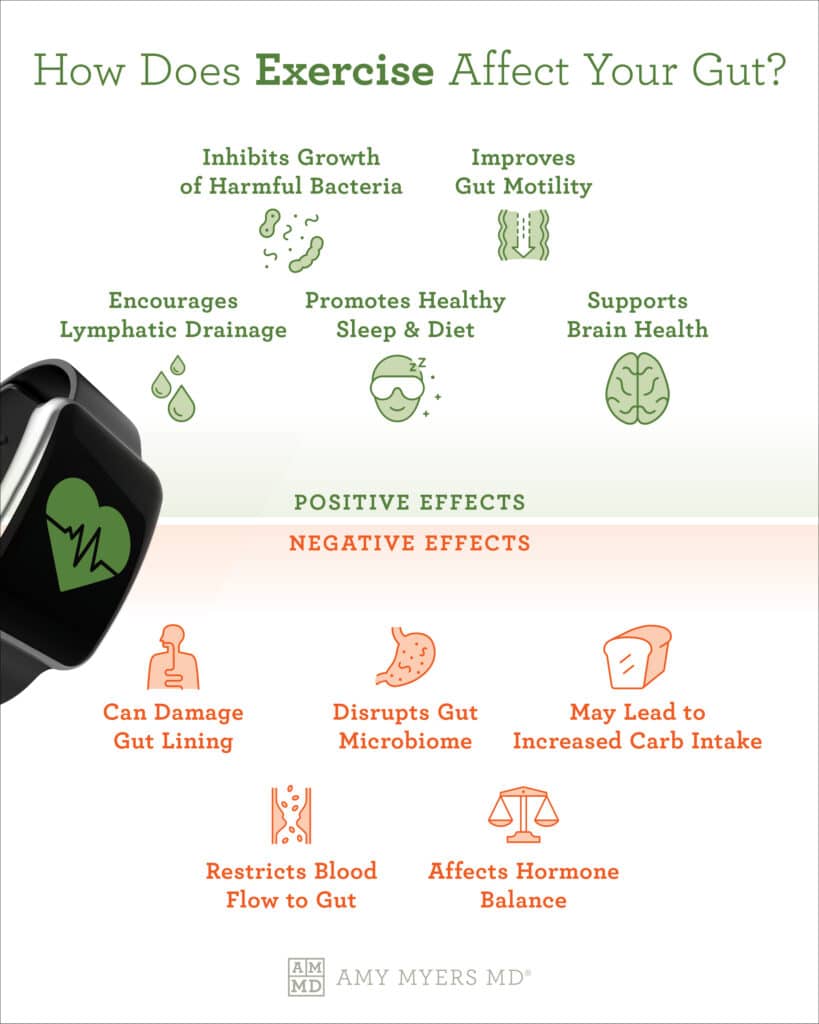Exercise has many benefits, including better memory and focus, stronger muscles, improved cardiovascular health, balancing hormones, and reduced feelings of anxiety and depression. Yet, a connection between exercise and leaky gut could make those benefits hard to come by.
If you’re overdoing it with physical activity, your gut becomes vulnerable to dysbiosis and intestinal permeability (leaky gut syndrome). I saw so many patients who thought they were healthy because they ran marathons and trained regularly, yet complained about digestive symptoms. The good news is that there is a solution.
I will tell you about the connection between exercise and leaky gut, why too much exercise could damage your gut, and my best tools to protect your gut health. To understand the link between exercise and leaky gut, you must first consider how your body responds to exercise.
Exercise is Stress on Your Body
While exercise is a healthy habit, it’s important to remember that your body recognizes physical activity as stress. Because it’s stress, your body responds the same way it would in a stressful situation such as traffic, financial stress, or a tight deadline at work– with the stress hormone cortisol. The higher the intensity of exercise, the more cortisol and adrenaline your adrenal glands produce.
Cortisol is a glucocorticoid released into the blood in response to stress. Almost every cell in the body has receptors for cortisol, so depending on what cortisol is used for, it can do everything from regulating blood glucose levels, blood pressure, and metabolism, facilitating an inflammatory response, influencing memory formation, and promoting the balance of electrolytes.1
Cortisol is necessary during exercise to stimulate your fat and carbohydrate metabolism to give your body a rush of energy to get through your workout. However, increased exercise intensity triggers your body to utilize muscle glycogen stores for energy instead of fat and glucose from carbohydrates, which can cause a temporary blood glucose level spike.2
Moreover, too much intense exercise keeps cortisol levels elevated and can cause gut permeability, leading to leaky gut. I’ll talk more about leaky gut in just a minute.
 Dr. Amy Myers
January 25th, 2023
https://content.amymyersmd.com/article/exercise-and-leaky-gut/exercise and leaky gut – infographic – Amy Myers MD®
Dr. Amy Myers
January 25th, 2023
https://content.amymyersmd.com/article/exercise-and-leaky-gut/exercise and leaky gut – infographic – Amy Myers MD®More is Not Always Better
It should come as no surprise that excessive exercise increases the amount of stress your body has to handle. Think of it the same way as chronic stress. Your stress response is always on if you engage in many high-intensity workouts.
When your stress response kicks in, your digestive system shuts down. Cortisol revs up your immune system and is highly inflammatory. This makes sense if you have an open wound and need inflammation to fight infection. It’s less helpful and even harmful if you are over-exercising and keeping your response always on.
Furthermore, excessive exercise depletes glutathione and glutamine reserves faster. Glutamine is an amino acid that promotes connective tissue growth and regulates the release of muscle glycogen during exercise. Your body also relies on glycogen for muscle recovery and growth.
When your body is rebuilding and repairing your muscles after stress, it signals your body to release glycogen to help swell the muscle along the connective tissue growth. This is where L-glutamine comes into play.
Suppose you are not giving your body a chance to rest and recover. In that case, your body continuously cycles through periods of high inflammation, which can damage the gut lining and suppress your immune system, which leaves your gut vulnerable to pathogens you might be ingesting.
Since too much cortisol increases gut permeability, those pathogens can enter your bloodstream. This is the connection between exercise and leaky gut syndrome.
What Is Leaky Gut?
So, what is leaky gut syndrome? Leaky gut happens when the tight junctions that hold your intestinal wall together become loose. Your gut uses projections called villi to control materials passing through your gut and into your bloodstream. These villi look like little fingers covered with hairs called microvilli. The villi grab micronutrients from the food you eat. The villi and microvilli push these micronutrients toward tiny openings in your gut wall directly into your bloodstream. Then, your blood carries this nourishment to all the cells in your body.
To better illustrate this process, imagine your gut as a drawbridge. Your gut is naturally semi-permeable to let teeny-tiny boats (micronutrients) pass through your intestinal wall and into your bloodstream. External factors, including certain foods, infections, toxins, and stress, can break apart the tight junctions in your intestinal wall, leaving the drawbridge open. Once this happens, you have a leaky gut.
When your gut is leaky, much larger boats never meant to get through (toxins, microbes, and undigested food particles) can escape into your bloodstream. Your immune system marks these foreign invaders as pathogens and attacks them.
The immune response to these invaders can appear in the form of any of the nine leaky gut symptoms. Let’s talk about them.
Signs of Leaky Gut
Hormonal imbalances, joint pain, and autoimmune diseases such as rheumatoid arthritis and Hashimoto’s thyroiditis, diabetes, fibromyalgia, anxiety, depression, eczema, and rosacea are linked to leaky gut syndrome.
A properly functioning digestive system is critical to good health. Problems in our gastrointestinal (GI) tract can cause more than stomach pain, gas, bloating, or diarrhea; they can cause many chronic health problems. If your intestinal wall is compromised, and you have a leaky gut, you’ll likely experience these symptoms and signs:
- Digestive issues such as gas, bloating, diarrhea, or irritable bowel syndrome (IBS)
- Food allergies or food intolerances
- Brain fog, difficulty concentrating, ADD, or ADHD
- Mood imbalances such as depression and anxiety
- Skin issues such as acne, rosacea, or eczema
- Seasonal allergies or asthma
- Hormonal imbalances such as irregular periods, PMS, or PCOS
- Diagnosis of an autoimmune disease such as rheumatoid arthritis, Hashimoto’s thyroiditis, lupus, psoriasis, or celiac disease
- Diagnosis of chronic fatigue or fibromyalgia
I’m not telling you to ditch your workout routine or not exercise. Exercise has too many benefits for your body. However, you’ll want to care for your gut health if you are overdoing it. I’ll tell you how you can support your gut health in just a bit. First, let’s talk about the right amount of exercise you need to get the benefits.
What is the Right Amount of Exercise?
According to the Physical Activity Guidelines for Americans, adults should engage in 150 minutes each week of moderate-intensity physical activity and two days of muscle-strengthening activity, such as weightlifting. 3
Body weight exercises such as pull-ups, walking lunges, and jumping jacks are excellent muscle strength activities. Walking, doing yoga or Pilates, riding a bike, or swimming are considered moderate-intensity activities. Even mowing your lawn provides the benefits of moderate-intensity exercise. My daughter, Elle, has taken up my love of swimming. It’s great that she’s learning to enjoy moving her body at such a young age!
Regardless of what exercise you are engaging in, it’s essential to care for your gut during exercise by supplementing with Collagen Protein, L-Glutamine, and Probiotics. Let’s discuss why.
How to Care for Your Gut While Exercising
As you can see, your gut health gets compromised with excessive exercise. However, using the following tools, you can heal your gut while supporting your body’s recovery from exercise. It starts with collagen.
Collagen for Exercise and Leaky Gut
Collagen Protein is crucial for healthy gut function because it contains amino acids that support gut health. Amino acids are the building blocks of proteins, hormones, and even neurotransmitters. Collagen Protein contains eight essential amino acids, meaning your body doesn’t make them on its own.
Collagen also contains three crucial nonessential amino acids – glycine, glutamine, and proline. Glycine is the primary amino acid in collagen. It’s created by modifying the amino acids serine, hydroxyproline, and threonine. This abundant amino acid is crucial for creating creatine in your muscles, which gives them energy. Along with proline, glycine rebuilds tissues in your gut lining, which keeps food particles, microbes, and bacteria from getting into your bloodstream.
Proline, arginine, and hydroxyproline also makeup collagen’s cellular structure, yet to a lesser degree. Vitamin C supports the process of converting these amino acids into collagen protein.4
L-Glutamine for Exercise and Leaky Gut
L-Glutamine is an amino acid that promotes a healthy gut barrier essential for repairing leaky gut. It is an excellent tool for repairing a leaky gut and supports a balanced insulin response, keeping your blood glucose levels in check and facilitating weight loss.
Moreover, L-Glutamine is the most abundant amino acid involved in muscle synthesis. Bones, skin, muscles, blood vessels, and even your hair and nails require amino acids such as L-Glutamine and Collagen Protein to grow and be healthy.
By enabling your enterocytes (gut cells) to regenerate more quickly, L-Glutamine helps seal the tight junctions in your gut and restores your gut lining to an optimal state even faster.
Probiotics for Exercise and Leaky Gut
To fully optimize your gut health while exercising, I recommend adding a probiotic with collagen and L-Glutamine. Functional medicine uses a 4R approach to treating leaky gut – remove, replace, reinoculate, and repair.
First, you remove all inflammatory foods from your diet. The next step is to replace the bad with the good by adding digestive enzymes to support optimal digestion and nutrient absorption and assist your body’s intestinal repair and inflammation responses. The third step is to restore the beneficial bacteria in your gut with probiotics to re-establish a healthy microbiome. The final step is to repair your gut with Collagen Protein and L-Glutamine.
If you are overdoing it with exercise, your gut bacteria are likely out of balance. Probiotics are live, beneficial bacteria that help keep your gut in balance. Probiotics do essential jobs in your body, including synthesizing vitamins such as the B vitamins thiamine and riboflavin, absorbing water, and fending off dangerous bacteria that can upset your gut microbiome.
The Final Word
As you can see, there is a strong connection between excessive exercise and leaky gut syndrome. The good news is there is a proven solution! By adding Collagen Protein, L-Glutamine, and Probiotics, and listening to your body when it needs to rest, you can support your gut health, break the link between exercise and leaky gut, and get optimal results from your workout!
Article Sources
- Cortisol: An Overview. Society of Endocrinology. 2022.
- Fundamentals of glycogen metabolism for coaches and athletes . Bob Murray and Christine Rosenbloom. Oxford Academic. 2018.
- How much physical activity do adults need?. Centers for Disease Control and Prevention. 2023.
- Collagen Synthesis. Dr. Anany Mandal. Medical Life Sciences. 2019.
